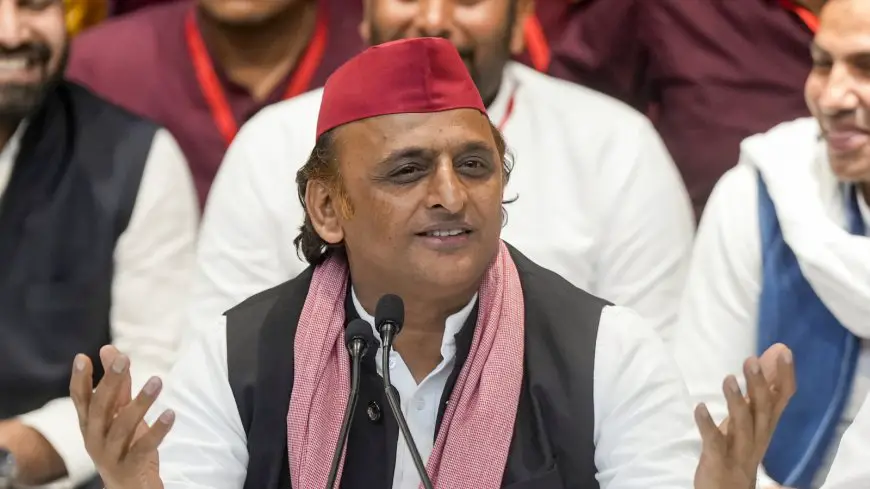Akhilesh Yadav Slams BJP’s ‘Authoritarianism’: Political Strategy or Democratic Warning?
Samajwadi Party chief Akhilesh Yadav has sharply criticized the BJP for alleged authoritarianism, sparking a renewed debate on democratic values and governance in India.

Introduction: A New Flashpoint in India's Political Battlefield
In a bold political statement that is already making waves across India’s political spectrum, Samajwadi Party president Akhilesh Yadav has accused the Bharatiya Janata Party (BJP) of steering the country toward authoritarian governance. Speaking at a press conference in Lucknow on June 10, 2025, Yadav alleged that the BJP is undermining democratic institutions, manipulating law enforcement agencies, and silencing dissent to consolidate unchecked power.
This latest accusation is not merely an election season provocation—it’s part of a growing chorus of opposition voices who say India’s democratic backbone is under siege.
You can read the full statement from the SP press release on their official website.
Yadav's Sharp Rebuke: What He Said and Why It Matters
Akhilesh Yadav, the former Chief Minister of Uttar Pradesh, did not mince words:
“The BJP is no longer functioning as a democratic party. It is running the country like a corporate boardroom where decisions are taken unilaterally, and institutions like Parliament, media, and even the judiciary are being sidelined.”
He also accused the BJP-led central government of:
-
Weaponizing central agencies like the ED and CBI to harass political opponents
-
Suppressing media freedom and influencing news coverage
-
Using police and administrative mechanisms to disrupt opposition rallies
-
Promoting “cult politics” around leadership instead of democratic dialogue
Yadav’s remarks came just days after Delhi CM Arvind Kejriwal was summoned again by the Enforcement Directorate in a fresh money laundering probe—an issue that many opposition leaders have cited as politically motivated.
BJP’s Response: Brushing Off the Allegations
The BJP hit back swiftly, calling Yadav’s comments “a desperate attempt to stay politically relevant.” BJP spokesperson Sudhanshu Trivedi stated:
“It is ironic that Akhilesh Yadav, whose party has a history of suppressing press freedom and democratic voices during its rule in Uttar Pradesh, is now preaching democratic values.”
While dismissing the authoritarianism claim as “baseless,” BJP leaders emphasized that the central government is focused on development, digital governance, and national security, which may sometimes require tough decisions.
For an overview of BJP’s governance model and institutional reforms, refer to this report by the India Foundation.
Authoritarianism or Discipline? The Wider Debate
The accusation of authoritarianism has become a recurring theme among opposition leaders ahead of the 2024–2025 electoral cycle. What Yadav terms “authoritarianism,” the BJP frames as “decisive leadership.”
Political analysts are divided:
-
Pratap Bhanu Mehta, constitutional scholar, noted in an op-ed for Indian Express:
“The blurring lines between strong leadership and authoritarian impulse are becoming increasingly visible in the Indian context.”
-
Others argue that India’s complex federal structure naturally restrains authoritarian overreach and that claims of rising authoritarianism lack consistent empirical backing.
Still, the Freedom House 2024 report downgraded India’s democratic rating, citing press freedom and civil liberties concerns. You can access the full report here.
Yadav’s Larger Political Strategy: Reviving Opposition Unity
This isn’t just about the BJP. Political observers say Yadav is using this narrative to position himself as a unifying voice within the fragmented Indian opposition.
He has already initiated:
-
Joint campaign meetings with leaders from Congress, RJD, AAP, and Left parties
-
A proposal for a “People’s Constitution Conference” to counteract what he calls the BJP’s “centralized governance”
-
Plans for statewide yatras themed around "saving the constitution" and "restoring democracy"
The Samajwadi Party’s alliance with Congress in Uttar Pradesh—one of India’s most electorally significant states—may serve as the testing ground for this anti-authoritarian pitch. Detailed polling data and projections can be found on CSDS Lokniti.
Implications Ahead of 2025 Elections
As India inches toward the 2025 general elections, Yadav’s accusations could:
-
Mobilize youth and civil society groups concerned about freedom of expression
-
Reignite debates on federalism, particularly over central-state power balance
-
Serve as fodder for campaign messaging across Hindi heartland states
However, the risk remains that such rhetoric—if not backed by policy alternatives—may be dismissed by the electorate as mere theatrics.
Conclusion: Words That Could Reshape the Election Narrative
Akhilesh Yadav’s sharp critique of the BJP’s governing style has added a new dimension to India’s political discourse. Whether this leads to meaningful democratic introspection or fades into the usual noise of electioneering remains to be seen.
What is clear, however, is that questions around authoritarianism, institutional autonomy, and democratic resilience will dominate public debate in the months ahead.
For a comprehensive timeline of central agency actions against opposition leaders, refer to this investigative piece by The Wire.














